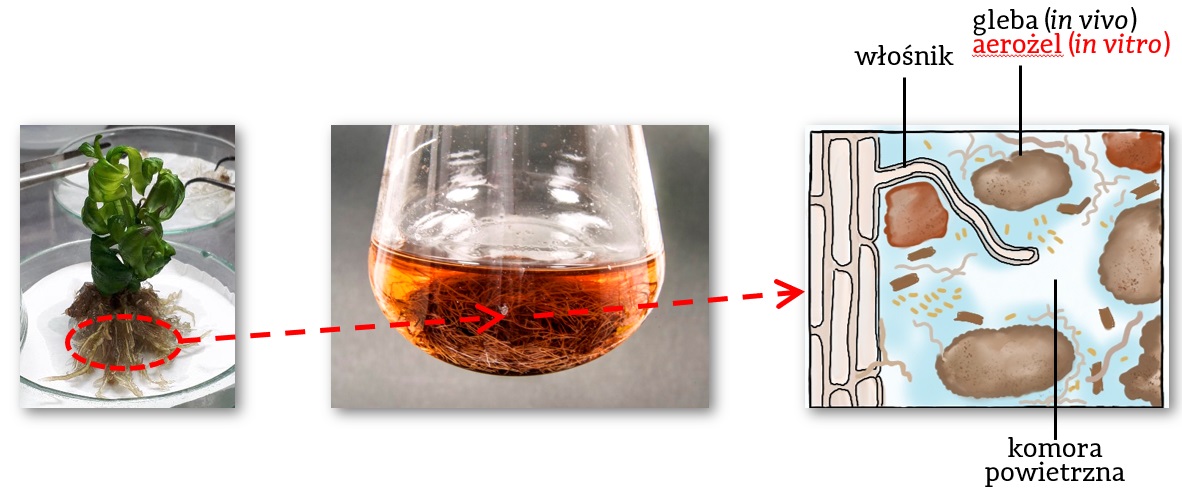Organosilicon aerogels in plant biotechnology and bioprocessing engineering
A group of collaborating researchers from the Warsaw University of Technology and Warsaw Medical University is working on devising a platform intensifying biotechnological processes in plant biomass grown in in vitro cultures, as part of the research grant BIOTECHMED-2.
A platform for immobilizing transgenic roots, utilizing organosilicon aerogel with a varying morphology (structure and diameter of pores) and modified surface properties.
Researchers from the Faculty of Chemical and Process Engineering at WUT, in a collaboration with the team of the Faculty of Pharmacy at Medical Warsaw University (MUW) are conducting research to create a platform utilizing organosilicon aerogel strengthened with fiber used in in vitro cultures of transformed roots, also known as hairy roots.
“The form of plant biomass characterized by the massive growth of lateral roots covered with hairs, lack of secondary growth, and plagiotropism help to obtain unique active chemical compounds, which occur only in this part of a plant. The resulting production of pharmaceutically valuable botanic compounds has a steady and efficient course. The delicacy and mechanical sensitivity of biomass is a certain limitation, which makes its technological processing difficult,” says Maciej Pilarek, PhD, DSc, Associate Professor at the Warsaw University of Technology.
Engineer and biologist collaborate
The research team under the supervision of Katarzyna Sykłowska-Baranek, PhD from the Warsaw Medical University is working on producing plant biomass in which biosynthesis of compounds of pharmaceutical importance occurs. Research is being conducted on a small scale in a laboratory. The collaboration with WUT aims to change that. How?
“We have suggested using aerogels. A gel has a cross-linked structure filled with a liquid and an aerogel is a silicon skeleton filled with a gas, for instance, air. Silica is a soil component, and that is a natural ground in which plant roots grow. It does not negatively affect the root growth and the processes of the biosynthesis of chemical compounds occurring in roots. Additionally, aerogel has an extremely porous structure filled with air. The structure is ideal for being penetrated by developing roots,” explains Professor Pilarek.
An aerogel platform aims to secure the roots against bumping into the walls of a growth vessel or bioreactor, which damages them. This leads to decreasing the efficiency of the growth of root biomass. Additionally, during the research, it turned out that not only does the devised platform protect the roots but also intensifies the biosynthesis of biologically active compounds produced in roots and sought by the pharmaceutical industry.
“We have created favourable conditions for transformed root growth and obtaining pharmaceutically important metabolite,” says Professor Pilarek.
The significance of the project for cancer treatment
“It is estimated that by 2050 certain types of cancers will have increased by even 70%,” says Dr Katarzyna Sykłowska-Baranek, PhD. “For this reason, in the second stage of our project we are focusing on the analysis of obtained extracts in terms of their cytotoxicity towards the cells of the model line of cancer cells,” she explains.
Researchers are working on paclitaxel, among other things, which is a chemical compound from the taxane family. The compound is used in the treatment of breast and ovarian cancer.
“Paclitaxel cannot be effectively synthesized in a lab. Traditionally, the compound is isolated from the bark of the Pacific yew, which does not grow in our climactic zone. Moreover, it takes a few dozen years for the tree to contain enough paclitaxel in the bark. Hence our idea is to assess the effect of using the aerogel platforms with the Pacific yew biomass to increase the efficiency of biosynthesis of a compound with high chemotherapeutical potential,” explains Dr Katarzyna Sykłowska-Baranek.
Collaboration continues
Although work scheduled under the grant is nearly finished, the common project of the Varsovian universities has become a starting point for common research.
“A real researcher is never fully successful – all they have achieved becomes a starting point for other research,” says Dr Maciej Pilarek, Phd, DSc, Associate Professor.
-
Project “Bifunctional aerogel-based platforms for intensification of cytotoxic naphthoquinones biosynthesis in transgenic roots cultured in vitro” is funded as part of the Research Grant POB Biotechnology and biomedical engineering of the Excellence Initiative – Research University programme implemented at the Warsaw University of Technology.
Research team:
Maciej Pilarek, PhD, DSc, Associate Professor (Warsaw University of Technology, Faculty of Chemical and Process Engineering), Katarzyna Sykłowska-Baranek, PhD (Warsaw Medical University, Faculty of Pharmacy), Bartosz Nowak, MSc (Warsaw University of Technology, Faculty of Chemical and Process Engineering), Mateusz Kawka, MSc (Warsaw Medical University, Faculty of Pharmacy), Kamil Wierzchowski, MSc (Warsaw University of Technology, Faculty of Chemical and Process Engineering)


